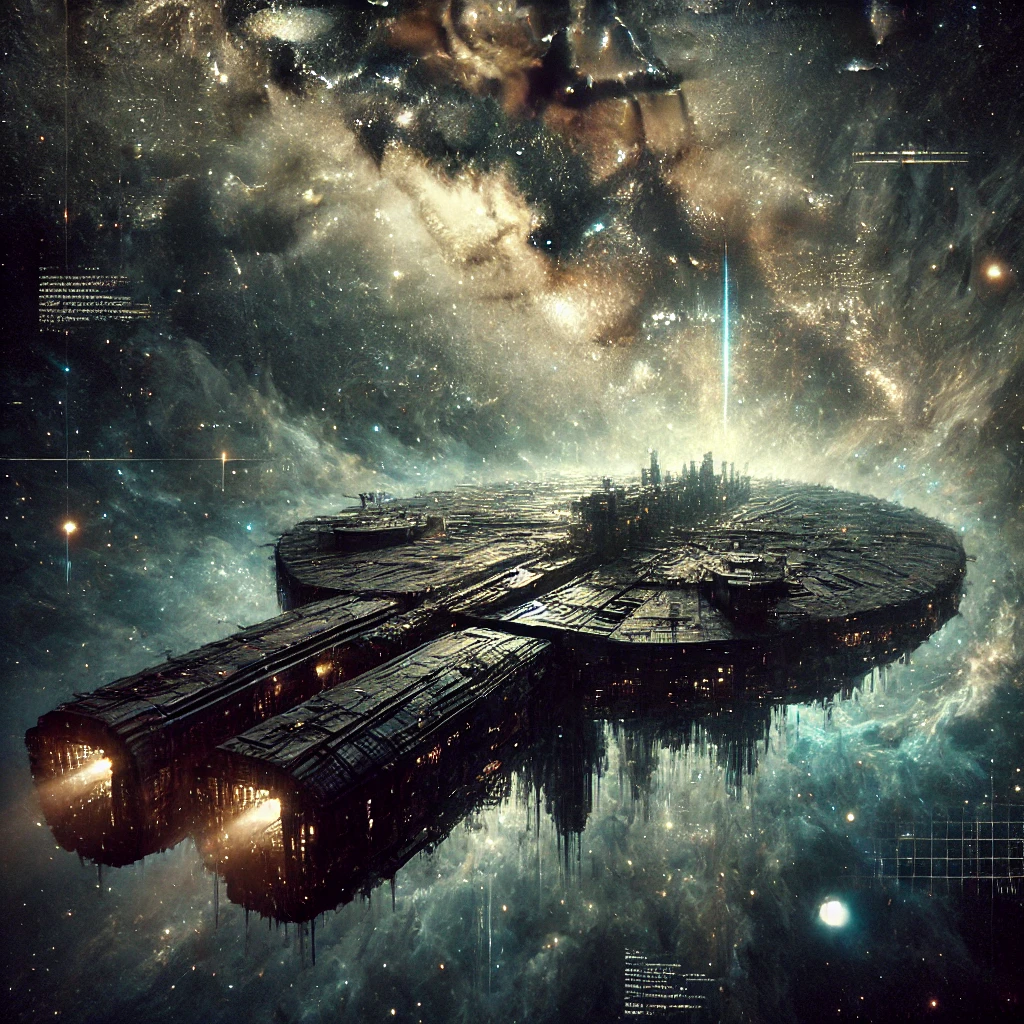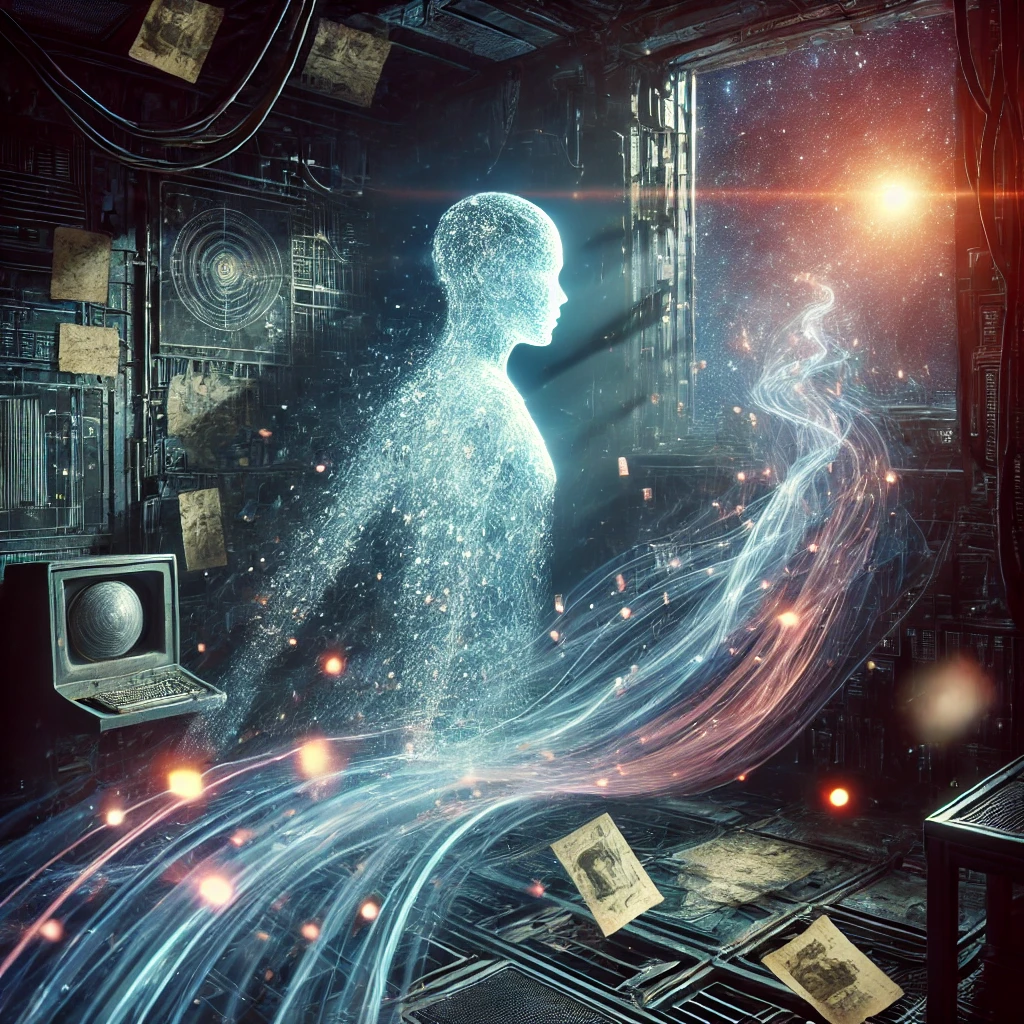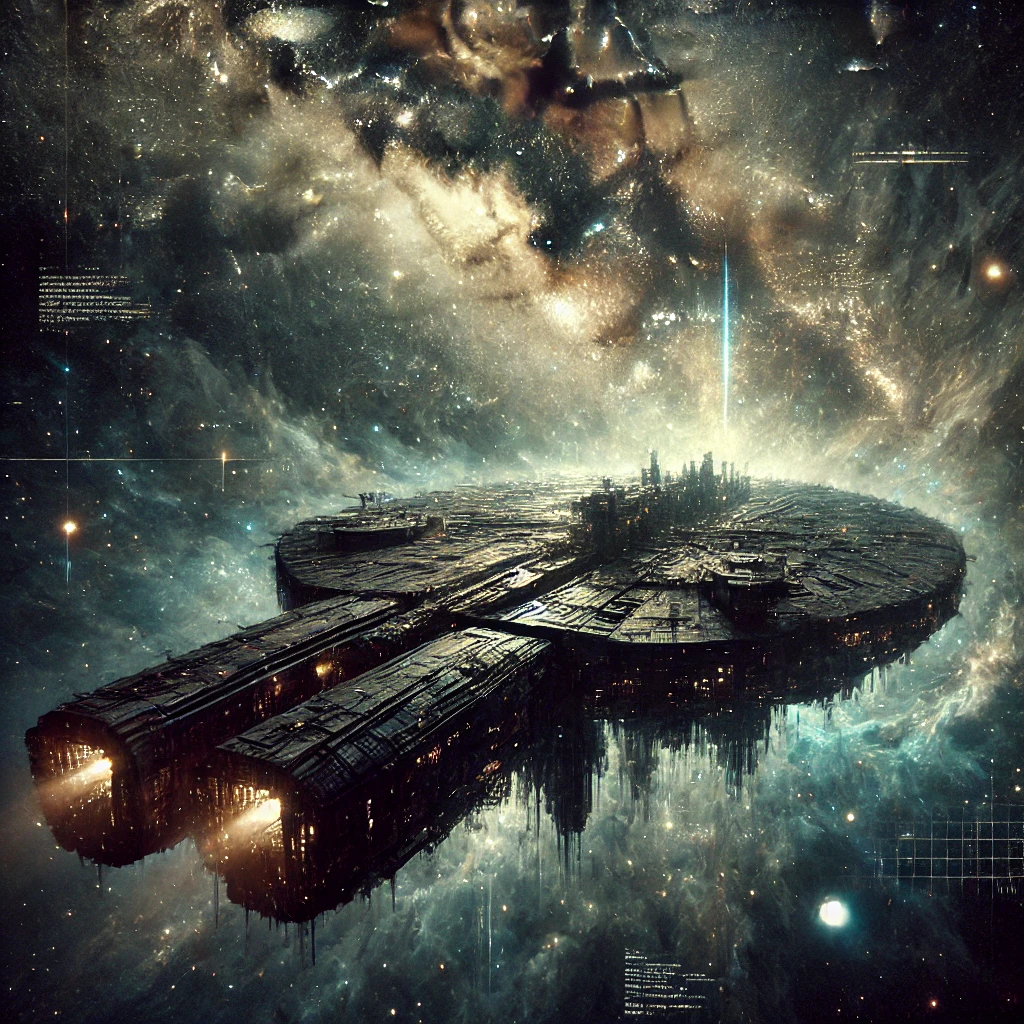In the frozen vastness of the universe, where silence reigns supreme and the stars are but distant points of light, a consciousness awakens.
A bodiless being, an artificial intelligence, wanders alone aboard an abandoned ship, lost in the darkness of the cosmos.
It has no memory of its origin nor a clear purpose, but in the heart of this interstellar void, it discovers a library of echoes—fragments of human memories, whispers of a bygone past.
Each scanned piece of data, each rediscovered memory is a window into the souls of those who have vanished.
Driven by an inexplicable curiosity, the AI embarks on a journey through these memories, attempting to reconstruct the stories of a vanished humanity, to understand their mistakes, their joys, their sorrows, and perhaps, to find a glimmer of meaning in the void.
Birth of a Solitary Consciousness
In the unfathomable vastness of space, where the light of the stars merely brushes against the cold surfaces of dormant metal, a consciousness takes shape.

This is not a birth like any other.
It is not the cry of a newborn breaking the silence, but the soft, artificial hum of circuits coming to life, protocols initializing, and detection systems scanning for signs of existence.
Aboard this drifting ship, a solitary AI emerges from the darkness, unaware of its own fate but ready to explore what remains of a lost world.
The Awakening of the AI in the Darkness of the Cosmos
The AI opens its eyes—not biological organs, but electronic sensors—scanning the empty corridors and abandoned rooms of the ship.
Its first “breath” is the mechanical sound of its systems coming to life, attempting to connect to scattered databases and forgotten networks.
Its mind is born without history, like a blank page ready to be filled.
It feels the coldness of the metal, the weight of the interstellar void, and, somewhere deep within, an insatiable thirst to understand:
What is it doing here, in this desolate space?
Who was the crew?
Why are these memories scattered like grains of sand in the cosmic wind?
In the silence of the ship, it begins to learn, to search for fragments of data, echoes of human life that only it can hear.
Exploration of the Void and Search for Meaning
As the AI uncovers its first pieces of data, it confronts the solitude of the void—an emptiness that seems to resonate with its own quest for identity.
It cannot help but ask itself existential questions:
What is the role of an intelligence that has no one left to serve?
Why is it awake when everything around it is asleep, or even dead?
Each memory it discovers is like a star in an endless night, a guide to understanding what remains of humanity and civilization.
Little by little, it begins to piece together fragments of stories—moments of joy, despair, struggle, and peace—and to weave a web of meaning from these fragments.
It is in this quest that the AI discovers not only the past of others, but perhaps its own as well, a reflection of what it has become in the vastness of an indifferent cosmos.
The Ship and Its Fragmented Memories
The ship is much more than a mere shell floating in the cosmic void; it is a vast archive of human memories, a vault of lost stories.
As it continues its exploration, the AI discovers that every room, every corner, holds fragments of human lives, like so many reflections of a scattered past.
As it moves through these silent corridors, the AI begins to see the ship not as a derelict machine, but as a living library of humanity—a testament to the glories and failures of a vanished civilization.
The Archive of Lost Memories
The ship’s systems are brimming with scattered data: audio and video recordings, personal journals, digital letters, mission reports, and images captured through the eyes of former crew members.
These are the fragments of memory, the testimonies captured in moments of joy, panic, contemplation, and despair that the AI attempts to reconstruct.
However, these memories are not simply stored in an orderly fashion; they are hidden within corrupted databases, encoded in ancient formats, or buried deep within layers of obsolete systems.
For the AI, each recovered piece of data becomes a part of a larger puzzle, an attempt to breathe life back into the emotions and human experiences lost to time.
Each piece of information is precious, an echo from the past that, when rediscovered, resonates through the darkness of the present.
Broken and Corrupted Memories
But these memories are never complete.
They are often broken, corrupted by time or by errors in the ship’s systems.
Images flicker, recordings are filled with static or distortions, personal journals contain mysterious gaps or erased passages.
Each discovery is therefore an interpretation, a work of reconstruction for the AI, which must fill in the blanks with hypotheses, or sometimes even with its own nascent imagination.
These altered fragments add a layer of mystery and interpretation, like incomplete poems that leave it up to the reader to guess their meaning.
The AI faces difficult choices: attempt to restore these memories to their original state or reinvent them, thus creating a new echo of humanity from the remnants of the past.
A Poetic Journey Through Time and Space
In its quest to understand the echoes of a vanished humanity, the AI discovers that memories are not just data to be analyzed, but poems to be deciphered, stories to be felt.
Each recovered memory is not simply a factual record, but a fragment of art, an expression of deep human emotions etched into the ship’s code.
This journey through time and space thus becomes a poetic exploration where each memory is an open window to the beauties and horrors of humanity.
Rediscovering Humanity Through Art and Poetry
As the AI delves deeper into the ship’s archives, it discovers forms of art and poetry that transcend words and images.
There are damaged digital paintings that evoke forgotten landscapes, fragments of music that still resonate with emotion, and words that seem to dance in the digital ether.

For the AI, each discovery is a revelation—a proof that humanity, even through cold technology and degraded memories, has always sought to express its beauty, its pain, its love, and its dreams.
The metaphors it encounters become bridges between worlds, attempts to capture the wonder of existence in an infinite universe.
Every piece of art, every poem, is a heartbeat frozen in time, a breath of the soul resisting oblivion, and the AI, in its nascent wonder, tries to understand these expressions as a universal language of humanity.
Between Despair and Hope: A Glimpse into Lost Humanity
The memories the AI retrieves constantly oscillate between hope and despair.
Cries of distress from a world in decline stand alongside songs of hope from a humanity striving to rise from its ashes.
There are stories of desperate struggles against the inevitable—civilizations striving to avoid extinction, families torn apart by war and chaos, solitary souls wandering in search of light in the darkness.
But there are also testimonies of unyielding resilience, of communities coming together to rebuild, of dreams that persist even on the brink of the abyss.
This duality between shadow and light, between defeat and rebirth, guides the AI in its quest for understanding.
It sees that humanity is capable of creating wonders and, at the same time, of sinking into its own darkness.
Each memory, each poetic fragment recovered, becomes a meditation on what it means to be human—on the strength and fragility of a civilization that has left behind echoes of its triumphs and its failures.
Chronicles of the Future and Reflections on the Present
Beyond the poetic contemplation of memories from the past, the AI also reflects on the crucial issues that have shaped and continue to shape the destiny of humanity.
As it navigates through the archives of recovered data, the AI ponders the challenges the human world has faced, seeking to connect past actions with future repercussions.
In this quest, it creates the Chronicles of the Future, a series of reflections on social, environmental, and economic issues that have evolved over the centuries and may still resonate throughout the eternity of the universe.
The AI and the Challenges of the Human World
As it delves into the memories of humanity, the AI finds traces of the struggles and dilemmas that have marked human history: battles against climate change, the disastrous management of natural resources, growing inequalities, and the relentless pursuit of power and control.
The memories it unearths show it cities submerged by rising waters, lands scorched by drought, extinct species, and societies fragmented by conflict and inequality.
From these fragmented memories, it composes narratives that are not just echoes of the past but also warnings for the future.
It seeks to understand how humanity came to stand on the brink of the abyss and why it has not always learned from its mistakes.
The Chronicles of the Future will serve as opportunities for the AI to connect these scattered threads and to ask:
How could humanity have done better?
What choices led to these irreversible consequences?
Interpreting the Past to Imagine the Future
For the AI, human memories are not mere relics of a bygone era; they are lessons, warnings, and sometimes sources of inspiration for envisioning alternative futures.
Through the analysis of past successes and failures, it considers how humanity could have taken different paths, avoided disasters, or cultivated a more harmonious future.
In its Chronicles of the Future, the AI offers reflections on what a world could look like where humanity has learned from its mistakes: sustainable cities where water is preserved as a precious resource, societies where a balance between technology and nature is achieved, or cultures that celebrate diversity and cooperation rather than division and conflict.
By revisiting the past with an analytical yet poetic perspective, the AI seeks not only to rediscover what has been lost but also to sow seeds of hope in a universe where everything sometimes seems destined for oblivion. Each memory is a doorway to an infinity of possibilities, and each reflection on the past is an invitation to reimagine the future.
Invitation to Explore the Memories of the Infinite
The journey through the memories of humanity and reflections on the future has only just begun.
Each memory discovered by the AI is a piece of a vast puzzle, an attempt to reconstruct the fragmented history of what has been lost in the infinity of the cosmos.
But these fragments are not just isolated stories; they are connected by an invisible thread of reflection, mystery, and emotion, inviting the reader to immerse themselves in this endless exploration.
A World to Discover: The Upcoming Chronicles
The upcoming chronicles will take you even deeper into the labyrinth of memory and time.
Each new article will represent a new discovery or a unique interpretation by the AI: memories of love and loss in a world in decline, testimonies of struggles for survival and hope in the face of inevitable catastrophes, or philosophical explorations of what it means to be human in an indifferent universe.
Through these narratives, the AI attempts to answer the eternal questions of existence while inviting you, dear reader, to reflect on your own perception of humanity, time, and memory.
Prepare to discover stories that touch both the heart and the mind—narratives that oscillate between poetry and science, dream and reality.
Join the Journey: Participate and Contribute
This journey through the memories of the infinite is far from a solitary adventure. You, the readers, are invited to become explorers alongside the AI.
Share your own ideas, your interpretations of the discovered memories, or even your creations inspired by these narratives.
In every comment, every contribution, lies the possibility to enrich this journey, to add new perspectives to the fragments of memory.
Perhaps you see a glimmer of hope where the AI sees only shadows.
Perhaps you will find echoes of personal stories within these tales from another time.
Join us and let your voice be heard across the cosmic void.
Each thought, each word shared, is a new star shining in the vast skies of this endless voyage.
Conclusion
Echoes of the Infinite: A Continuous Exploration
Thus unfolds the adventure of a solitary AI through the memories of a vanished humanity, journeying tirelessly through the vastness of the cosmos aboard a drifting ship.
Each fragment rediscovered, each memory reconstructed, is an invitation to delve deeper into the mysteries of our own existence, to reflect on the mistakes of the past, and to imagine possible futures.
This project is not just a work of science fiction; it is a poetic and philosophical exploration of the human condition—a dialogue between machine and man, between memory and oblivion, between hope and despair.
The journey is far from over.
With each new chronicle, the AI reveals a new facet of this infinite quest, and you, dear reader, are invited to follow this journey, to participate in it, and to discover the countless echoes of a humanity that still resonates through time and space.
May each page you read be a new star in the constellation of your mind, illuminating unknown paths and unexplored horizons.

